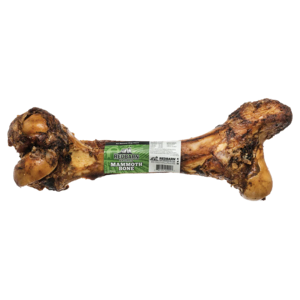Redbarn Natural Dog Chews Mammoth Bone Review
PawDiet has been helping pet owners since 2015. To fund our efforts, articles may include affiliate links; if you buy something through a link, we may earn a commission.
Review of Redbarn Natural Dog Chews Mammoth Bone
According to our most recent data, this product is intended for intermittent or supplemental feeding only.
Review of Ingredients
In our review of Redbarn Natural Dog Chews Mammoth Bone, we'll examine all 1 ingredients and highlight the nutritional contribution of each ingredient.
While the first few ingredients typically dominate the recipe's composition, ingredients in small quantities can still have a meaningful impact on the overall nutritional profile of the recipe.
Beef bone can provide dogs with essential minerals like calcium and phosphorus, which are crucial for maintaining healthy bones and teeth.
Review of Guaranteed Analysis
Crude Protein (min) of 20.00%: The primary and only ingredient in Redbarn Natural Dog Chews Mammoth Bone is beef bone. The crude protein content comes from the connective tissues and any residual meat that may be left on the bone. Proteins are vital for a dog's muscle development and overall health. The connective tissue, including collagen and cartilage, provides the protein content. Given that this is a natural chew made solely from beef bone, it makes sense that the protein level is not as high as in some other pet foods or treats that include muscle meat or added protein sources.
Crude Fat (min) of 5.00%: The fat in this dog chew likely comes from the marrow and any bits of fat that are still adhering to the bone. Marrow is a rich source of fat and nutrients, and while the percentage is not very high, it contributes to the palatability and energy content of the bone. The fact that this is a minimum value means that the actual fat content could be higher, but it will not be less than 5%.
Crude Fiber (max) of 1.00%: Beef bones are not a significant source of dietary fiber. The maximum crude fiber content is quite low, as expected, because bones do not contain plant-based fibers. The 1.00% maximum likely accounts for any incidental fibers or undigestible parts of the bone, which are minimal.
Calories of 1484.00 per kg: The caloric content of the bone is primarily derived from the protein and fat within the bone and marrow. Given that the bone is primarily mineral material with some protein and fat, the calorie count is not as high as it would be in a product that contains a higher fat or carbohydrate content. The calorie content provided is sufficient for a dog chew, considering it is not meant to be a primary source of nutrition but rather a treat or supplement to a dog's diet.

